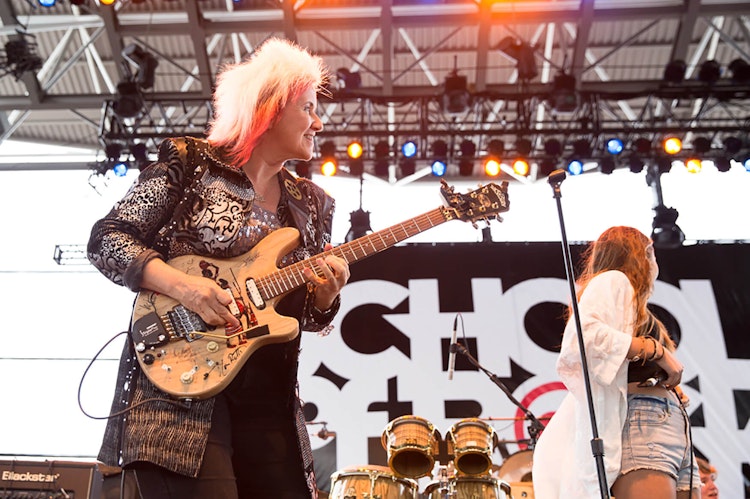Despite what its image in the 20th century might suggest, the guitar hasn’t always been a symbol of masculinity. In the 18th and 19th centuries, guitars were seen as women’s instruments. Guitars were smaller back then, and in the 1800s, the parlor guitar—a small, compact model—was developed for women. As a result, women, such as Spanish virtuoso Madame de Goñi, were some of the greatest early guitarists.
But as the commercial availability of steel strings in the early 1900s accompanied the general popularization of the instrument, it found a new home among a male demographic. By the time rock emerged in the 1950s, the guitar had come to be viewed as masculine—a supposed quality that was reinforced by the media. In their study of music ads in Seventeen magazines from 1944 to 1981, Lyn Ellen Burkett and Kim Wangler note, “girls were pictured … standing near guitars, and watching boys playing guitars, but rarely was a girl shown holding or playing a guitar.
Now, 40 years later, more and more female guitarists have played a role in the evolution of rock and been recognized for their contributions. They are shredders, bandleaders, singer/songwriters, sidewomen, and more. They’ve become platinum-selling artists and have lead musical movements. Read on to see the many examples of women in rock.
JOAN JETT
Perhaps one of the biggest names in rock, bandleader/guitarist Joan Jett rose to fame in the ‘80s with her band the Blackhearts. Starting out in the late ‘70s with all-girl rock group the Runaways and switching to a brief solo career from 1980-81, Jett became known for her loud, defiant, no-frills rock edge, which can be heard on songs like “I Hate Myself for Loving You,” “Bad Reputation,” and most famously, her Top Ten hit “I Love Rock ‘n’ Roll.” Joan Jett and the Blackhearts was inducted into the Rock and Roll Hall of Fame in 2015.
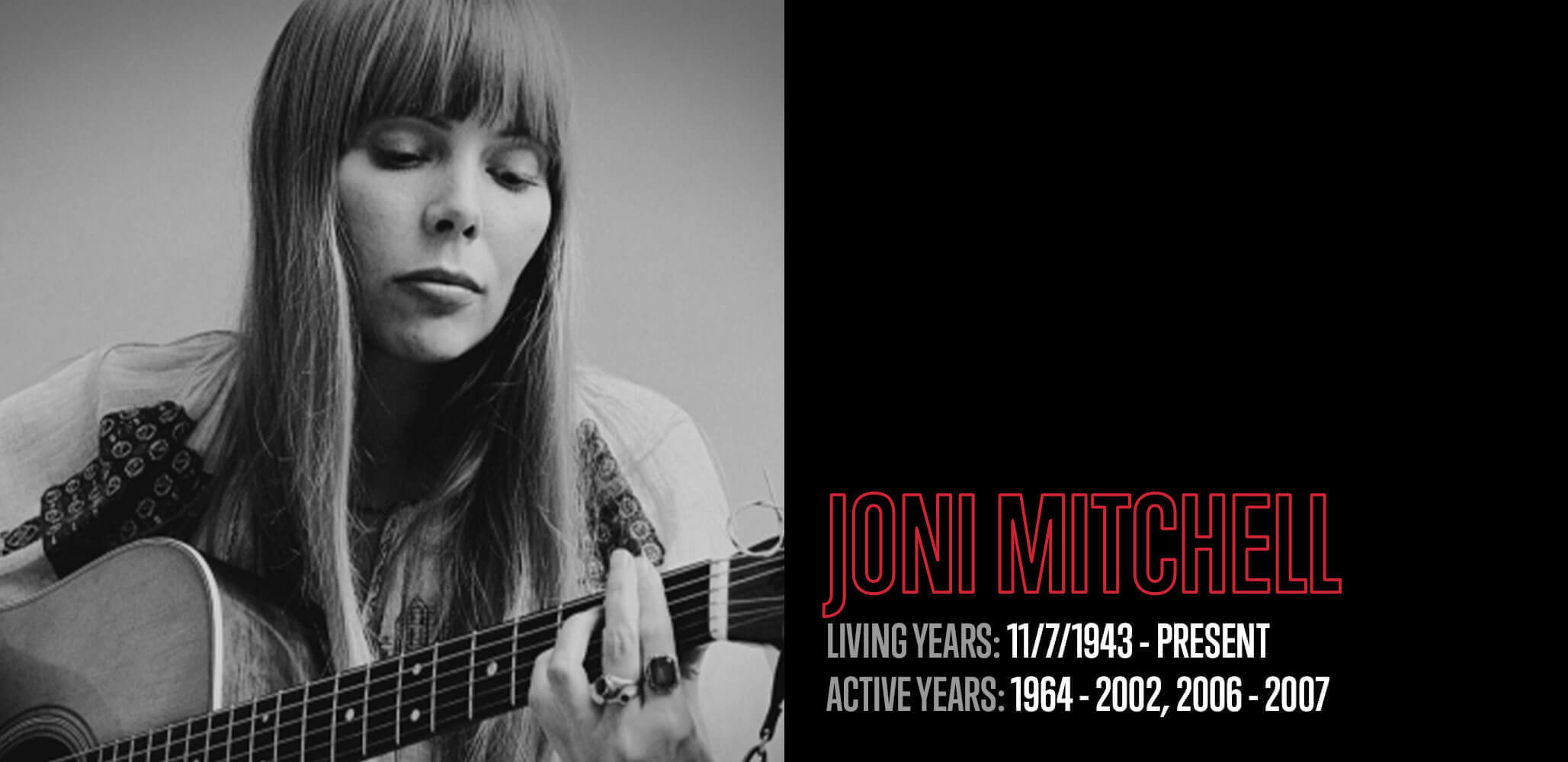
JONI MITCHELL
Starting out in the ‘60s, singer-songwriter Joni Mitchell is one of the most influential, poetic, and multi-faceted artists to have emerged from the mid-20th-century folk scene. Born Roberta Anderson in Alberta, Canada in the early ‘40s, Mitchell adopted her stage name shortly before she moved to America in 1966. Early singles “Chelsea Morning,” “The Circle Game,” and “Both Sides Now,” the latter brought to a wider audience by Judy Collins, first put her on the map. Then, following the release of her debut album, Song to a Seagull in 1968, she went on to produce such masterpieces as the traditional folk album Blue (1971), jazz-rock record Court and Spark (1974), and jazz-fusion work Hejira (1976), among others.
LITA FORD
With a career that began with the Runaways, pop/hard rock/metal guitarist Lita Ford made a name for herself in the ‘70s and ‘80s as a shredder who could hold her own in a male-dominated genre. After the dissolution of the Runaways in 1979, Ford embarked on a solo career that began with the 1983 release Out of Blood and peaked with 1988’s pop-metal record Lita. She reached number 12 on the charts with her single “Kiss Me Deadly,” and broke through to the Top Ten with her duet with Ozzy Osbourne, “Close My Eyes Forever.”
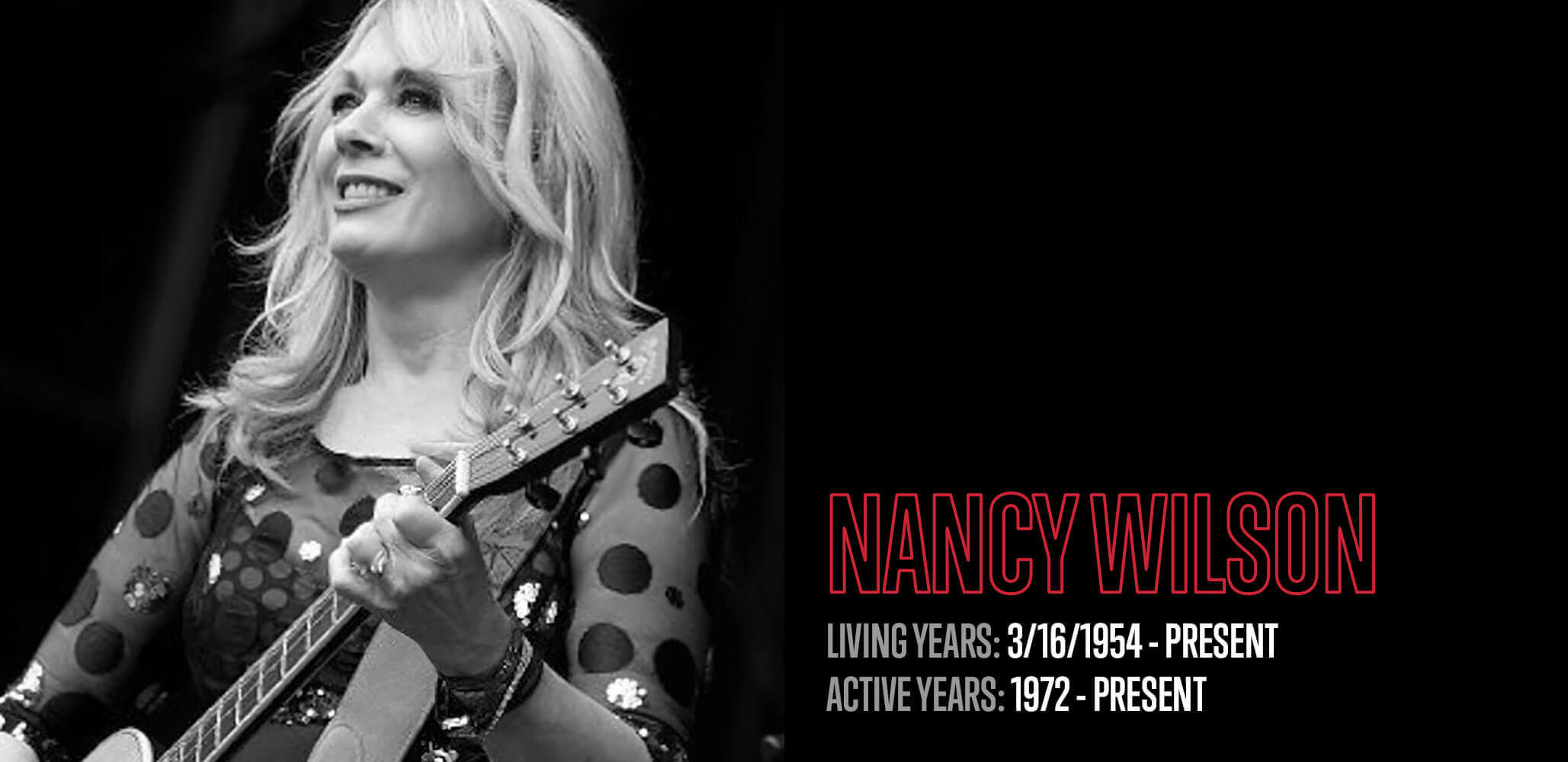
NANCY WILSON
Rock ‘n’ roll force Nancy Wilson’s versatile career started with Heart, a ‘70s pop-rock outfit lead by her and her sister Ann. Among other singles, her guitar work can be heard on their greatest hit, “Barracuda.” The band has released albums periodically since their formation, landing one in the Top Ten in four different decades. Outside of her work with Heart, Wilson composed the score to the film Elizabethtown in 2005, and in 2009, released Baby Guitars, an instrumental children’s album. Most recently, she released her first proper solo album You and Me in 2021.
MELISSA ETHERIDGE
Roots rock songwriter and guitarist Melissa Etheridge has become known not only for her music but for her activism in and outside of the music community. Diagnosed with breast cancer in 2004, Etheridge performed at the 2005 Grammy Awards while still bald from chemotherapy treatments. Since her public coming out in 1993, she has been a gay and lesbian activist, and in 2007, she won the Academy Award for Best Original Song for “I Need to Wake Up,” featured in An Inconvenient Truth. To top it all off, her 1993 album Yes I Am spent 138 weeks on the charts, making her a multi-platinum artist.
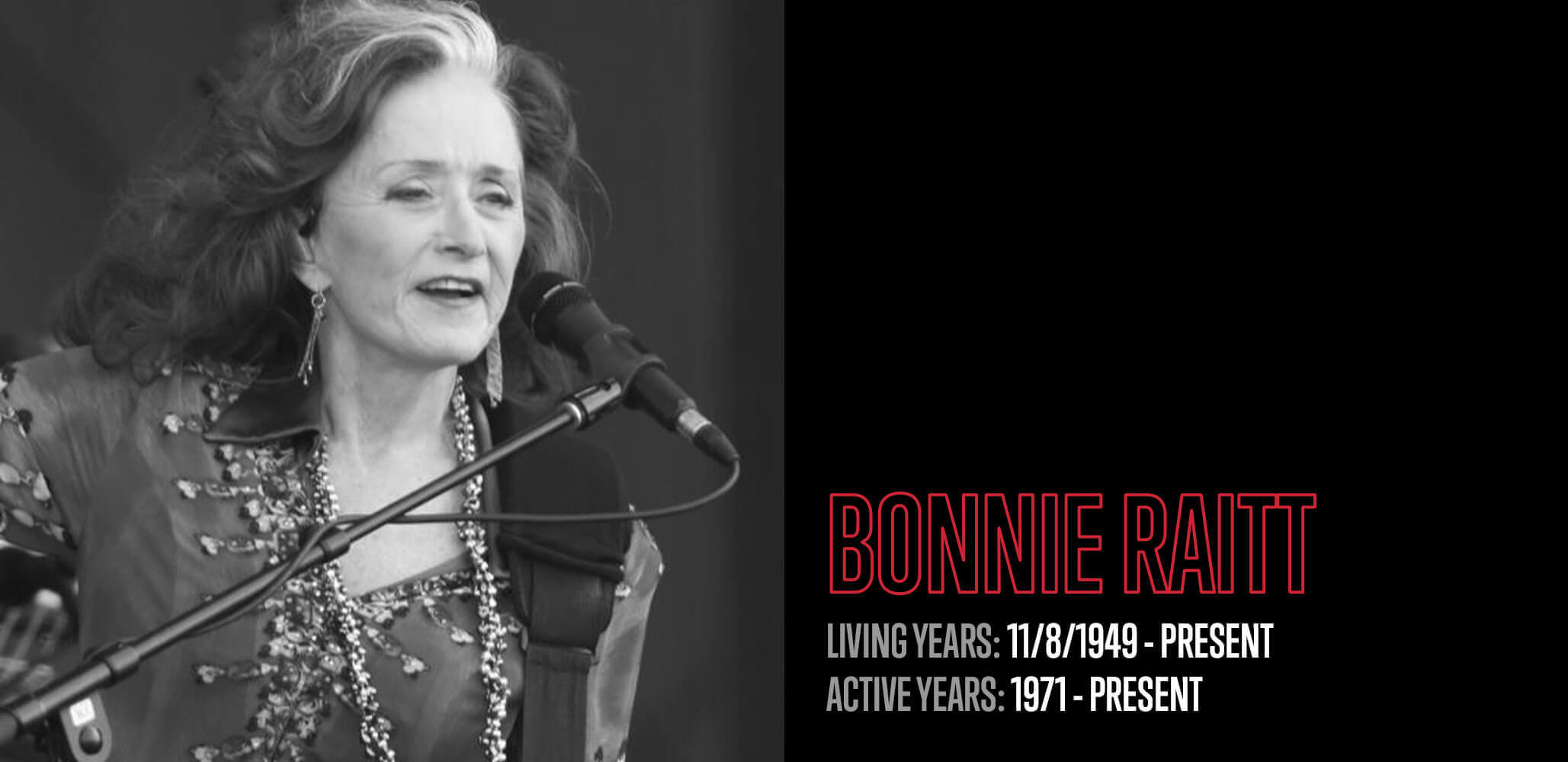
BONNIE RAITT
Recognized as one of few women who played bottleneck guitar in the 1970s, blues/rock/R&B artist Bonnie Raitt reached commercial success in the late 1980s with her release Nick of Time. As she came into the spotlight, Raitt was lauded for both her guitar skills and distinctive voice, and went on to play with fellow big-name artists such as Warren Zevon, Little Feat, Jackson Browne, The Pointer Sisters, and John Prine. Today, she has 10 Grammy Awards to her name, and appears on Rolling Stone’s list of the 100 Greatest Guitarists of All Time.
ORIANTHI
Australian pop-rock guitarist Orianthi Panagaris—who performs under her first name—began playing guitar at the age of six. By 15, she and her high school band were opening for virtuoso Steve Vai, and just three years later, she impressed her hero Carlos Santana so much that he said she would be his first choice if he were to “pass the baton.” She came out with her debut record, Violet Journey in 2005, but has since made a name for herself by playing with Michael Jackson on his This Is It album and tour and joining Alice Cooper’s touring bands in 2011. In 2015, she joined Cooper’s supergroup, Hollywood Vampires, with Johnny Depp and Joe Perry.
SUSAN TEDESCHI
What guitarist and singer Susan Tedeschi brings to modern blues is part of what keeps the genre fresh and evolving. Mixing classic R&B, blues, and gospel, Tedeschi first entered the scene as a singer, later forming the first iteration of her blues band when she graduated Berklee College of Music in 1991. Cultivating their chemistry around Boston in the ‘90s, the band released their debut album Just Won’t Burn in 1998. In 2011, she merged her band with that of her husband Derek Truck’s to form the Tedeschi-Trucks band. Tedeschi has garnered six Grammy nominations since 2000, and in 2012, won the Grammy Award for Best Blues Album with the Tedeschi-Trucks Band’s Revelator.
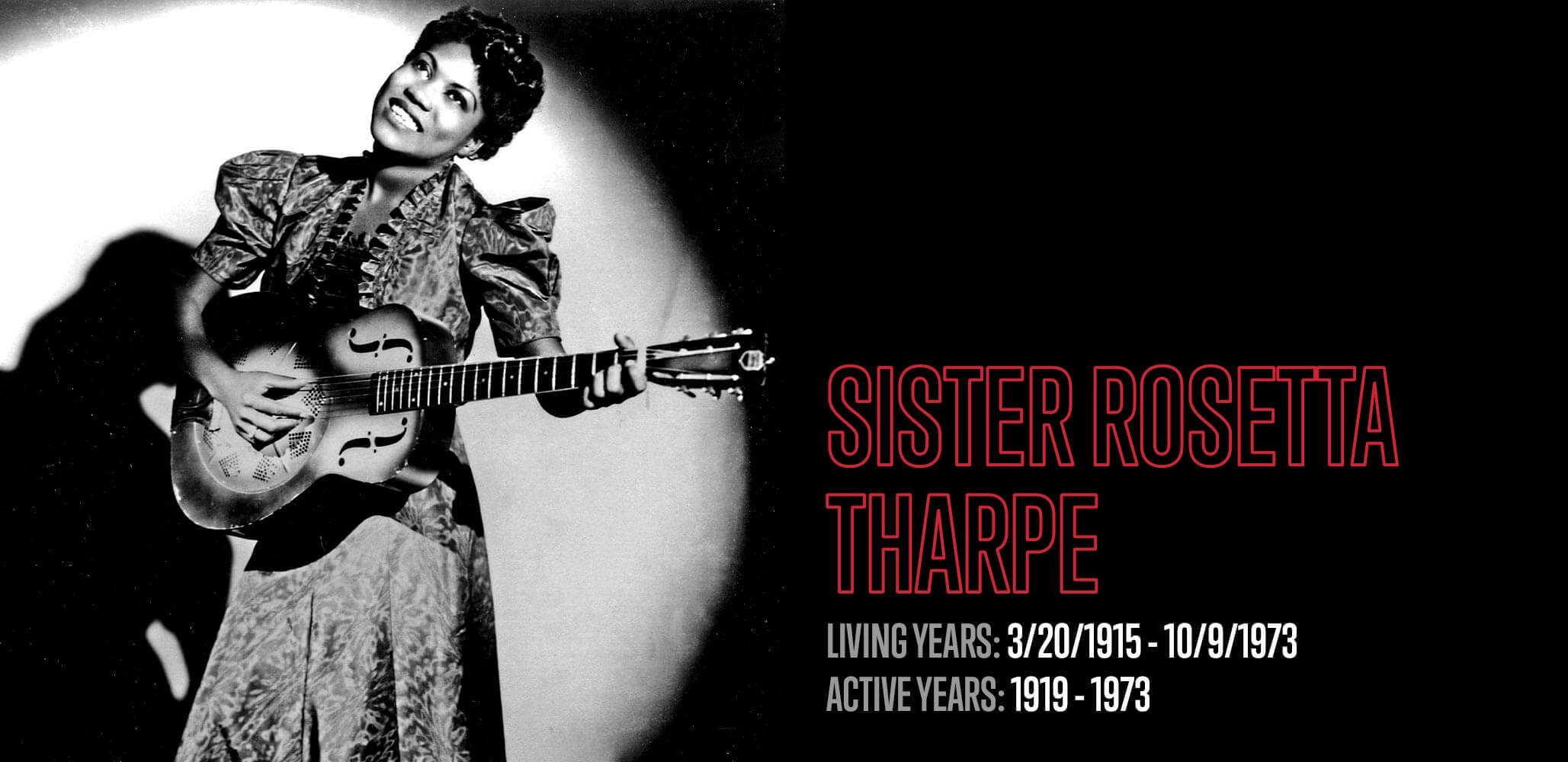
SISTER ROSETTA THARPE
Hailed as the “Godmother of Rock ‘n’ Roll,” songwriter and guitarist Sister Rosetta Tharpe gained popularity in the ‘30s and ‘40s, and has since become a legend for her role in the development of rock. As a small child, she joined her mother in touring with a traveling evangelical troupe, where she was billed as a “singing and guitar playing miracle.” Her 1945 hit, “Strange Things Happening Every Day,” was the first gospel record to cross over, hitting no. 2 on Billboard’s R&B chart. In recent years, she was the subject of the 2011 documentary Sister Rosetta Tharpe: The Godmother of Rock & Roll, and in 2018, was inducted into the Rock and Roll Hall of Fame as an Early Influence. Her jubilant, soulful style is said to have influenced Little Richard, Johnny Cash, Elvis Presley, and Jerry Lee Lewis.
YVETTE YOUNG
Virtuosic math rock guitarist Yvette Young was born into a musical family, with parents who both happen to be accordionists. She began taking piano and violin lessons as a small child, before later picking up the guitar. She started posting videos of her playing online in 2009, and gradually gained recognition for her two-handed guitar-tapping technique. For several years Young remained a solo act—then in 2014, she formed math rock group Covet. While she has a theory background on piano, Young says that on guitar, she composes with just her ear, which leads her to come up with unconventional chord shapes and experiment with alternate tunings.
CARRIE BROWNSTEIN
A leading figure in the riot grrrl scene that exploded out of Olympia, Washington in the early ‘90s, Carrie Brownstein is a guitarist known for her onstage ferocity. She formed the influential Excuse 17 while attending college at Evergreen State, then co-founded what would become her most well-known group, Sleater-Kinney, as a side project. Excuse 17 eventually disbanded, but Sleater-Kinney went on to release 10 studio albums. Critics have called them one of the greatest rock bands of the early ‘00s, and Brownstein is the only woman to appear on Rolling Stone’s 2006 list, “The Twenty-Five Most Underrated Guitarists.” Brownstein is also known for her role on the popular comedy series Portlandia.
VICKI PETERSON
Rock guitarist Vicki Peterson became a cornerstone in female rock history for her role in forming ‘80s pop rock group the Bangles. One of the few all-female bands of the ‘80s to reach commercial success, the Bangles released three records in the ‘80s (before their reunion in the late ‘90s), penning enduring hits like “Manic Monday” and “Walk Like an Egyptian.” During the band’s hiatus in the early and mid-‘90s, Peterson toured with female musical peers the Go-Go’s and joined both the Continental Drifters and the Psycho Sisters, playing with now sister-in-law Susan Cowsill.
WENDY MELVOIN
In rock history, it’s not just the artists in the spotlight who deserve accolades. Best known for her role as a guitarist in Prince’s backing band, the Revolution, Wendy Melvoin first recorded with Prince live in 1983 when she was just 19 years old, at a concert where some of the live recordings were later included on Purple Rain. In 1986, Melvoin left the Revolution with girlfriend Lisa Coleman to form duo Wendy & Lisa. Together, the women composed the score for the first season of Heroes, then later the title theme to Nurse Jackie, for which they won an Emmy. Melvoin has also recorded with Madonna and Glen Campbell.
CHARO
Known for her flamboyant and uninhibited stage presence, flamenco guitarist Charo’s image is illustrated in part by her skills as a comedienne. After studying under Andrés Segovia, father of the classical guitar, in her youth, she went on to become a well-known actress in the ‘60s and ‘70s, appearing on shows The Love Boat and The Tonight Show with Johnny Carson. Charo has only released a handful of albums over the course of her multi-decade career, and in 1995, she won the award for Billboard’s Female Pop Album of the Year for her album Guitar Passion.
ELIZABETH COTTEN
The music of Elizabeth Cotten, a blues and folk guitarist born in 1893, was almost lost in obscurity had it not been for chance. Cotten bought her first guitar at the age of 12, and taught herself how to play left-handed—not on a lefty guitar, but on a righty guitar turned upside-down. Her unique way of playing alternating basslines with her fingers (as opposed to her thumb) has become known as Cotten picking. Cotten had retired from playing for decades before being discovered by the family of Pete Seeger while working for them as a housekeeper—they then helped her to make home recordings. Her signature song “Freight Train” and others have been covered by Joan Baez, Bob Dylan, and Jerry Garcia.
JENNIFER BATTEN
Rock guitarist Jennifer Batten has made a career for herself as a sidewoman to some of the greatest names in rock. Most notably, she’s played on all three of Michael Jackson’s world tours from ’87 to ’97 and has toured and recorded with legendary rock guitarist Jeff Beck. Batten has also released three albums as a solo artist, published two guitar books, and produced three educational guitar courses for popular online lesson platform TrueFire. In January 2016 she received the She Rocks Icon award and was inducted into Guitar Player Magazine's “Gallery of the Greats.”
NILI BROSH
Israeli-born rock guitarist Nili Brosh has left her mark on the genre through both her solo albums and work as a self-described “hired gun.” The 33-year-old musician has performed and recorded with Danny Elfman, Cirque du Soleil, Dethklok, Guthrie Govan, and Jennifer Batten. Her solo recordings have featured the Aristocrats’ Marco Minnemann and Bryan Beller, and as a sidewoman, she recorded on Beller’s album Scenes from a Flood alongside Dream Theater guitarist John Petrucci. For her work with Cirque du Soleil, she was a featured performer in their production Michael Jackson: One, playing iconic Michael Jackson guitar solos while fire shot out of her guitar.
KAKI KING
Perhaps one of the most experimental guitarists on this list, Kaki King has been actively pushing the limits of the guitar since the start of her career in 2001. The virtuosic player and composer, who also plays lap steel guitar, has been recognized for her use of unconventional percussive techniques and her multimedia productions, as well as her musical contributions to the films August Rush and Sean Penn’s Into the Wild. Her multimedia production The Neck Is a Bridge to the Body, debuted at Brooklyn’s BRIC Theater in 2014, and featured projections cast onto her Ovation guitar. Her latest release, Modern Yesterdays, drew from what was intended to serve as a score to a multimedia show entitled Data Not Found, whose production was halted by the pandemic.
MOTHER MAYBELLE CARTER
Born Maybelle Addington in 1909, Mother Maybelle Carter was a country musician who played with folk act the Carter Family from the late ‘20s to early ‘40s. One of the first to use the guitar as a lead instrument in country music, Carter is recognized as the originator of the “Carter scratch,” a guitar technique which involves picking the bass line on the low strings and frailing the high strings with the pointer finger, in sequence. In the ‘60s and ‘70s, she recorded a handful of solo albums, and her 1973 self-titled double record set placed on the Billboard US Country chart when she was in her sixties.
LIONA BOYD
Dubbed the “First Lady of the Guitar” by critics, classical guitarist Liona Boyd has been one of the most popular in her genre since the early ‘80s. Starting guitar at age 13, the Canadian-born Boyd studied under classical legends Andrés Segovia and Julian Bream as a teenager. She performed at NYC’s Carnegie Hall at 26, and toured with Gordon Lightfoot that same year. To date, she’s released 26 studio albums—with three platinum and four gold in Canada—and has recorded with Chet Atkins, Eric Clapton, Al Di Meola, David Gilmour, and Yo Yo Ma.
The contributions women have made to rock have been just as important, diverse, and influential as those made of men. From inventing new techniques, such as Cotten picking or the Carter scratch, to experimenting with new styles, to playing alongside musical legends and becoming ones themselves, women have made a significant impact through both individual approaches and virtuosity. And, if you meet anyone who might doubt that, just show them this list—and they’ll be sure to change their mind.
School of Rock has guitar lessons for all skill levels of guitarists. From beginner lessons to guitar lessons for kids to guitar lessons for adults, every guitarist has a place on stage at School of Rock. Learn more and sign up for a trial lesson below.
ABOUT THE AUTHOR
Kate Koenig is a singer-songwriter, multi-instrumentalist, and music journalist based in Brooklyn, NY. Along with teaching guitar, bass, keyboard, and vocals at School of Rock Williamsburg, she interviews professional musicians and edits music notation for Premier Guitar and Acoustic Guitar magazines. When teaching music, she focuses on discovering the quickest way to help a young musician realize their personal connection with and strengths in music, and how capable they are of growing in their art.



